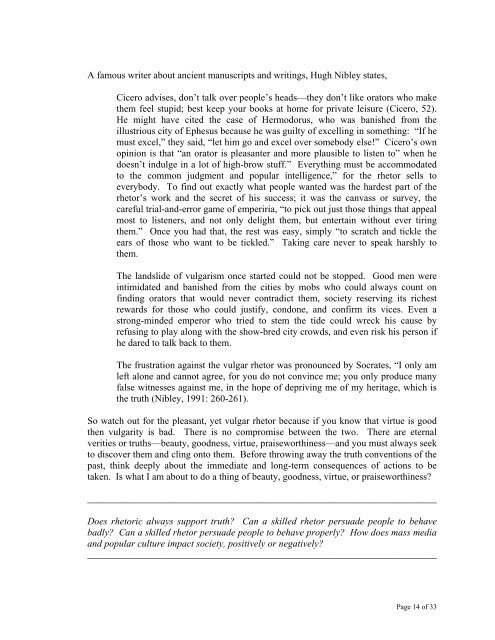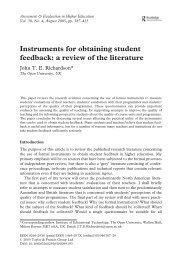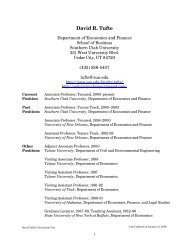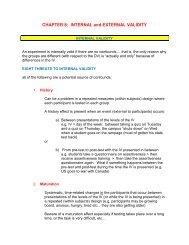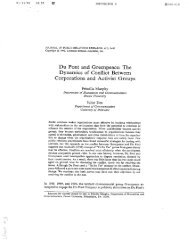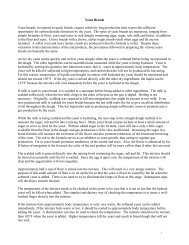Jeffrey Barnes: Self-Evident Truths - Southern Utah University
Jeffrey Barnes: Self-Evident Truths - Southern Utah University
Jeffrey Barnes: Self-Evident Truths - Southern Utah University
You also want an ePaper? Increase the reach of your titles
YUMPU automatically turns print PDFs into web optimized ePapers that Google loves.
A famous writer about ancient manuscripts and writings, Hugh Nibley states,<br />
Cicero advises, don’t talk over people’s heads—they don’t like orators who make<br />
them feel stupid; best keep your books at home for private leisure (Cicero, 52).<br />
He might have cited the case of Hermodorus, who was banished from the<br />
illustrious city of Ephesus because he was guilty of excelling in something: “If he<br />
must excel,” they said, “let him go and excel over somebody else!” Cicero’s own<br />
opinion is that “an orator is pleasanter and more plausible to listen to” when he<br />
doesn’t indulge in a lot of high-brow stuff.” Everything must be accommodated<br />
to the common judgment and popular intelligence,” for the rhetor sells to<br />
everybody. To find out exactly what people wanted was the hardest part of the<br />
rhetor’s work and the secret of his success; it was the canvass or survey, the<br />
careful trial-and-error game of emperiria, “to pick out just those things that appeal<br />
most to listeners, and not only delight them, but entertain without ever tiring<br />
them.” Once you had that, the rest was easy, simply “to scratch and tickle the<br />
ears of those who want to be tickled.” Taking care never to speak harshly to<br />
them.<br />
The landslide of vulgarism once started could not be stopped. Good men were<br />
intimidated and banished from the cities by mobs who could always count on<br />
finding orators that would never contradict them, society reserving its richest<br />
rewards for those who could justify, condone, and confirm its vices. Even a<br />
strong-minded emperor who tried to stem the tide could wreck his cause by<br />
refusing to play along with the show-bred city crowds, and even risk his person if<br />
he dared to talk back to them.<br />
The frustration against the vulgar rhetor was pronounced by Socrates, “I only am<br />
left alone and cannot agree, for you do not convince me; you only produce many<br />
false witnesses against me, in the hope of depriving me of my heritage, which is<br />
the truth (Nibley, 1991: 260-261).<br />
So watch out for the pleasant, yet vulgar rhetor because if you know that virtue is good<br />
then vulgarity is bad. There is no compromise between the two. There are eternal<br />
verities or truths—beauty, goodness, virtue, praiseworthiness—and you must always seek<br />
to discover them and cling onto them. Before throwing away the truth conventions of the<br />
past, think deeply about the immediate and long-term consequences of actions to be<br />
taken. Is what I am about to do a thing of beauty, goodness, virtue, or praiseworthiness?<br />
________________________________________________________________________<br />
Does rhetoric always support truth? Can a skilled rhetor persuade people to behave<br />
badly? Can a skilled rhetor persuade people to behave properly? How does mass media<br />
and popular culture impact society, positively or negatively?<br />
________________________________________________________________________<br />
Page 14 of 33


